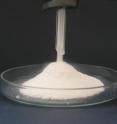'Dry water' could make a big splash commercially
An unusual substance known as "dry water," which resembles powdered sugar, could provide a new way to absorb and store carbon dioxide, the major greenhouse gas that contributes to global warming, scientists reported at the 240th National Meeting of the American Chemical Society. The powder shows bright promise for a number of other uses, they said. It may, for instance, be a greener, more energy-efficient way of jump-starting the chemical reactions used to make hundreds of consumer products. Dry water also could provide a safer way to store and transport potentially harmful industrial materials. Carter explained that the substance became known as "dry water" because it consists of 95 percent water and yet is a dry powder. Dry water was discovered in 1968 and got attention for its potential use in cosmetics. Scientists at the University of Hull, U.K. rediscovered it in 2006 in order to study its structure, and Cooper's group at the University of Liverpool has since expanded its range of potential applications. One of the most recent involves using dry water as a storage material for gases, including carbon dioxide. In laboratory-scale research, Cooper and co-workers found that dry water absorbed over three times as much carbon dioxide as ordinary, uncombined water and silica in the same space of time.
In another potential new application, the scientists also showed that dry water is a promising means to speed up catalyzed reactions between hydrogen gas and maleic acid to produce succinic acid, a feedstock or raw material widely used to make drugs, food ingredients, and other consumer products. "There's nothing else quite like it," said Ben Carter, Ph.D., researcher for study leader Professor Andrew Cooper. "Hopefully, we may see 'dry water' making waves in the future."
Source: American Chemical Society
Other sources
- ‘Dry water’ could make a big splash commerciallyfrom Science BlogWed, 22 Sep 2010, 20:28:17 UTC
